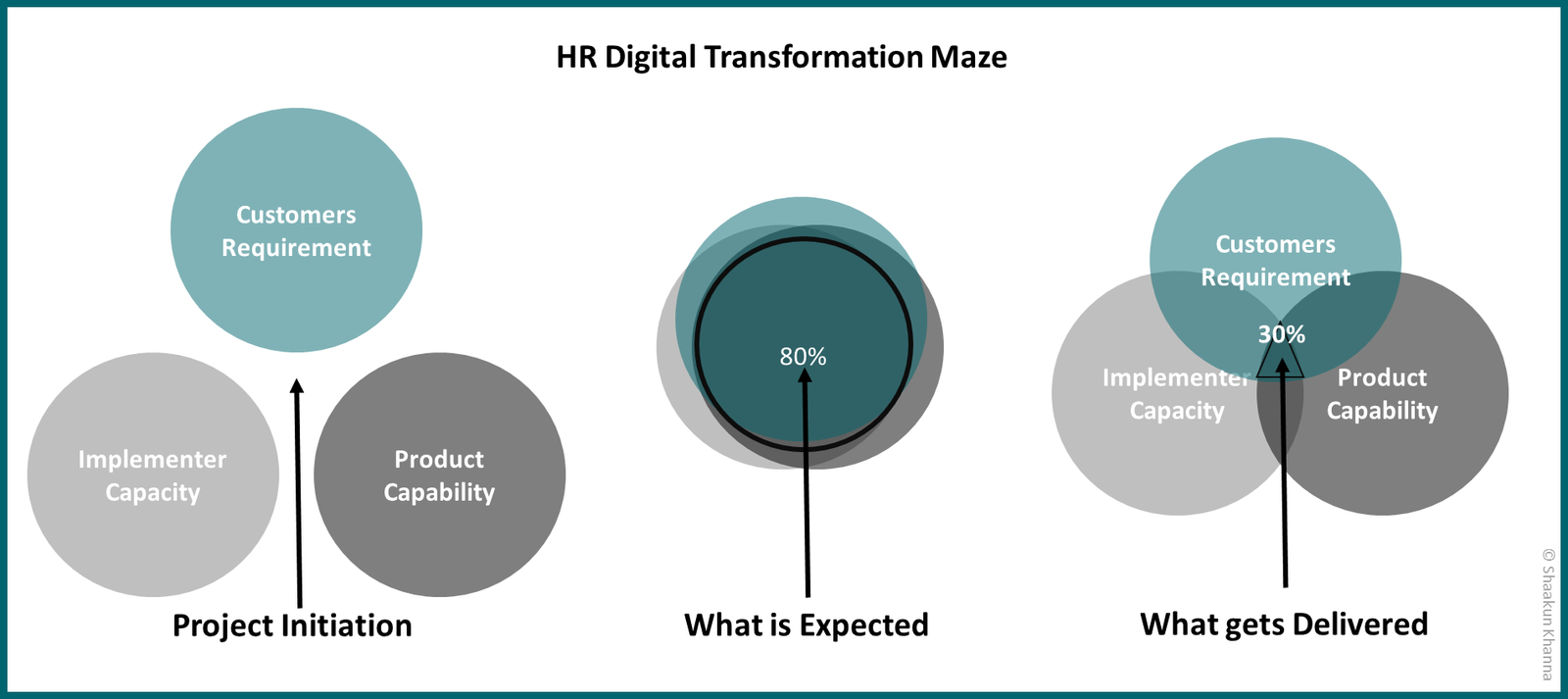
Why most Digital HR transformation projects fail
Boston Consulting Group has stated that 80% of Digital Transformation endeavors fail to deliver on their promises. When it comes to Digital HR Transformation, Josh Bersin’s study indicates that 42% of organizations view their HR systems implementation as either failed or only partially successful.
So, what are the underlying reasons behind the failures of Digital HR transformation?

-
- Choosing the Wrong Product: The flashy sales pitches and persuasive marketing tactics often lead organizations to invest in solutions that are more “best sold” than “best fit” for their unique needs. Tech giants employ savvy sales team’s adept at convincing customers of the superiority of their products, regardless of suitability. As a result, organizations end up with solutions that may be technologically very capable but fail to address their specific HR challenges adequately in the context of their unique cultures.
- Lack of Clarity on Requirements: In the realm of HR, not everything that can be digitized is essential, and all that is essential, cannot be digitized. Without a clear understanding of the organization’s unique requirements, it’s easy to fall prey to the futuristic appeal of digital solutions that may not align with actual needs. This lack of clarity often leads to investments in unnecessary or ill-suited technologies.
- Scarcity of Talent: The intersection of digital transformation and HR requires a rare breed of professionals who possess deep expertise in both domains. Unfortunately, such individuals are a rarity, leaving many organizations vulnerable to incorrect decision-making, setting impractical aspirations, or underestimation of the complexity of the project. To mitigate this risk, enlisting the support of external consultants with a nuanced understanding of both HR and digital transformation is crucial.
- Absence of Comprehensive Digital Strategy: Digital transformation initiatives are frequently pursued in siloes, with different departments independently investing in technology solutions. This fragmented approach results in digital silos and confusion, rather than a cohesive digital ecosystem aligned with overarching business objectives. A holistic organizational-level digital strategy, integrating HR tech with broader business strategy, is imperative to avoid this pitfall.
- Lack of Willingness to Adopt New Practices: Most business leaders insist on replicating their old processes and practices in the new digital systems. This is not only unsustainable but unintellegent too. The new age products are designed to deliver best practice process and experiences and therefore, to the extent possible, must be used as delivered ‘out of the box’.
- Underestimation of Implementation Effort: The success of a digital solution hinges not only on its features and functionality but also on its effective implementation. However, budgetary pressures often lead organizations to underestimate the effort required for successful implementation. This can result in rushed or incomplete deployments, undermining the potential benefits of the chosen technology.
- Lack of Change Management: Digital transformation entails more than just the adoption of new technology; it necessitates a fundamental shift in organizational culture and processes. Yet, many initiatives neglect to incorporate comprehensive change management plans, encompassing learning, unlearning, and embracing new ways of working. Without proper change management, resistance to new technologies and workflows can derail even the most well-intentioned efforts.
- Insufficient Leadership Commitment: HR tech projects often lack support and leadership commitment at the highest levels of the organization. Some are viewed merely as automation or efficiency-enhancing projects and fail to garner the strategic attention and resources necessary for success. Board and CEO-level involvement is essential to drive meaningful digital transformation in HR.
Addressing the underlying issues requires a holistic approach, encompassing clear requirements definition, strategic alignment, talent development, comprehensive digital strategies, meticulous implementation, robust change management, and unwavering leadership commitment. Crucially, enlisting the expertise of external consultants versed in both HR and digital transformation can provide invaluable guidance and support, steering organizations toward successful digital HR initiatives.
